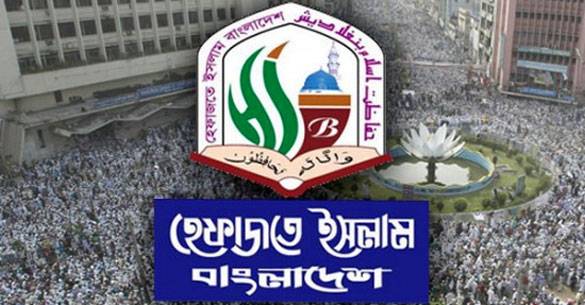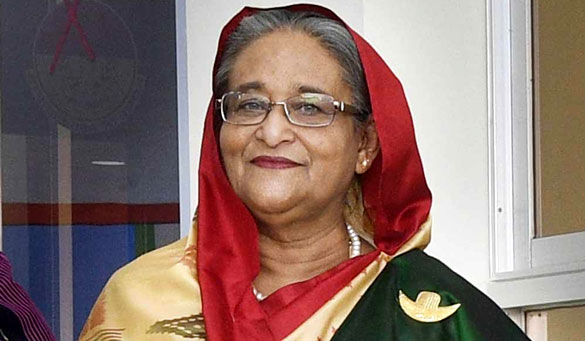Sheikh Hasina's 'Strategic Compromise' With Hefazat-e-Islam Turning Bangladesh Into An Extremist Hotbed Once Again
New Age Islam Special
Correspondent
4 December
2020

Over the
last couple of years, Bangladesh has seen a rise in religious extremism and
communal hatred. Attacks on cultural activists and secularists have also seen a
rise. This is mainly because of Sheikh Hasina government's policy of 'Strategic
Compromise' with the conservative and extremist organisation Hefazat-e-Islam for
political purposes. The Hefazat is an umbrella organisation of madrasa teachers
based in Chittagong with links to Jama't-e-Islami and other dozens of Islamist
organisations that aim to turn Bangladesh into an Islamic state. Sheikh
Hasina's position earlier was that the Hefazat had links to Jama't-e-Islami.
The organisation had organised a massive rally in Dhaka in April 2013 against
Shahbagh Movement staged to demand capital punishment for war criminals
associated with the Jamat-e-Islami and the BNP.
However,
strangely the Hasina government wooed the Hefazat before the general elections
that were held on December 30, 2018 in order to garner the vote bank held by
the Islamist parties and the influential clerics. Since, the Election
Commission had deregistered the Jamat-e-Islami that had a considerable hold
over the religious or madrasa section, the Sheikh Hasina government allied with
Hefazat to counter Jamat-e-Islami’s influence over the madrasa section and
general Muslims.
Though
Hefazat and its affiliates always allied with the BNP, they allied with Sheikh
Hasina's Awami League as part of a 'Strategic Compromise'. Before the
elections, the Hefazat organised a huge rally in support of Awami League which
was addressed by Sheikh Hasina.
Hefazat-e-Islam
formed an Islamic Democratic Alliance with 15 Islamist parties to support Awami
League in the elections. This helped Awami League with a resounding victory in
the polls.
But the
going has not been easy for the Hasina government since then. The Hefazat has
been blackmailing the Hasina government into accepting its demands and its
leader Junaid Babunagri has been issuing Taliban like diktats to the
government.
In 2021,
Father of Nation Sheikh Mujibur Rahman's centenary year falls and the nation is
gearing up for the celebrations. The Hasina government has planned to install a
grand statue of Sheikh Mujibur Rahman in Dhaka but the leader of Hefazat
Maulana Junaid Babunagari has threatened to stop any installation of the statue
of Sheikh Mujib on the grounds that it is un-Islamic.
Earlier in
2017, Sheikh Hasina government had removed the statue of the Greek Goddess of
Justice Themis from the precincts of the Supreme Court after the Hefazat had
staged demonstrations against the statue.

Junaid
Babunagri had last Friday held a rally in Hathazari in Chittagong in which he
issued four demands to the government. 1) Closure of all activities of
International Society of Krishna Consciousness (ISKCON) in Bangladesh. 2)
Banning religious activities of the Ahmadiyya community and declaring them
un-Islamic 3) Expulsion of French Ambassador 4) Closure of French Embassy in
Dhaka.
On 2
November Junaid Babunagari had staged a huge demonstration against the French
government in Dhaka and had planned a march from Bait ul Mokarram Mosque in
Dhaka to the French Embassy. But due to police barricading he had to cancel the
march. However, he had threatened to launch another movement if the French
embassy was not closed and the ambassador not expelled. He even threatened to
destroy the embassy if his demand was not met.
Because of
his strong arm tactics, the government has already accepted the demands of the
Hefazat that affect the secular fabric of the country and violate the spirit of
the Constitution.
The
government omitted educational content of schools that the Hefazat considered
un-Islamic. The government also removed content related to non-Muslim authors
from the primary and secondary school textbooks under Hefazat's pressure. The
Hasina government recognised the below standard Qaumi Madrasa degrees and in
return the Hefazat honoured Sheikh Hasina with the title of Mother of the Qaum.
The biggest
challenge before the Hasina government is the installation of the statue of her
father Bangabandhu Mujibur Rahman next year. Shahryar Kabir, the man
instrumental behind the War Crimes Tribunal and documenting extensively the
atrocities perpetrated by the pro-Pakistani forces in 1971 said, "We are
confronted with a Taliban leader. The Deputy Minister of Education Mahibul
Hasan Choudhury has said that action would be taken against those who opposed
the installation of Bangabandhu sculpture if they did not apologise.
The
opposition to the statue may turn into a serious confrontation as Junaid
Babunagari has threatened to launch a violent protest against the statue.
By
espousing the issues of blasphemy, statues, madrasas and Rohingyas, Junaid
Babunagari is actually trying to project himself as the leader of the Muslim
masses. Sheikh Hasina's 'Strategic Comprise' with Hefazat is going to turn
Bangladesh into a hotbed of religious extremism as the link of a former Hefazat
leader with Al Qaida and Hizbul Mujahideen is commonly known. The support of
Pakistan to Hefazat cannot be ruled out.
Sheikh
Hasina had come to power with the support of the masses and her party manifesto
is based on secularism, democracy and equality but now Sheikh Hasina
government's policy seems to be drifting away from its basic principles and
taking the country towards chaos, extremism and anarchy under pressure from
Hefazat and other Islamist forces. The Digital Security Act was passed under
their pressure which is being used for blasphemy cases against secularists and
cultural activists.
If Sheikh
Hasina does not cut her ties with Hefazat and continues to pander to their
extremist ideology, Bangladesh will again become a hotbed of religious
extremism.
URL: https://newageislam.com/the-war-within-islam/sheikh-hasina-trategic-compromise-with/d/123662
New Age Islam, Islam Online, Islamic
Website, African Muslim News, Arab World News, South Asia News, Indian Muslim News, World Muslim News, Women in Islam, Islamic Feminism, Arab Women, Women In Arab, Islamophobia in America, Muslim Women in West, Islam Women and Feminism
